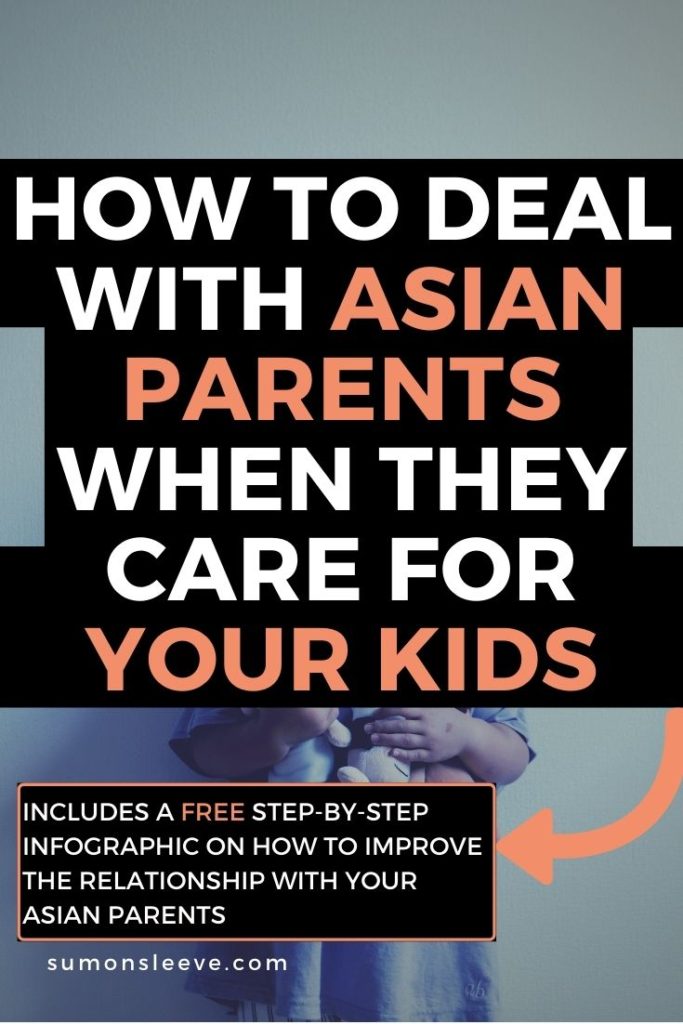Asian grandparents often take care of their grandchildren. As a mom, how did I make this work peacefully without blowing a fit at my parents?

How I made it work without pulling my hair out
A year from now, my daughter will start Kindergarten. That means, no more getting spoiled for days at Gong Gong Por Por’s (Grandpa and Grandma’s) house. My maternity leave will be over and my son will be taking her place, 3 days a week, every week, rain or shine until he starts school.
It’s been like that for the past 3 years. And during this experience, it’s spurred many tough, anxiety-inducing conversations, frustrations, ah-ha moments and revelations, enough for me to write an entire book titled, “How to Deal With Asian Parents.”
Seeing your parents at least 3 times a week would either make you shudder in fear or smile in comfort. Over time, it’s become the latter.
The other day while I was picking my daughter up, I asked my mom,
“Are you having fun, mom?”
She stares at me,
“Are you kidding me? Of course! This is the most fun I’ve had in years. Your daughter says so many funny things. She makes me laugh until I cry. I’m going to make the most of this time before she starts Kindergarten.”
They cared for her since she was a baby
When she said this, I started to reflect on the significance of their influence on our daughter’s life and how it didn’t start out that way.
I remember the day when I first dropped her off and went to work. I was nervous, anxious, worrying all day at my desk about how it will go. She was still a baby, not walking, barely talking. My parents had to change her diaper, feed her bottled milk and put her down for naps. It was quiet, slow-moving, grunt work. My parents adjusted, gaining confidence, getting to know their granddaughter, her cries, her needs, her personality.
The experience was an awakening for my dad which has been amusing for my mom because she did most, if not all, of the childcare duties when we were young. He never changed a single diaper of ours’ or gave any of us a bath. My sister’s kids live in Alberta so he’s never had to care for them at this level. So watching my mom get entertained as he fumbled his way into his caretaker role has been incredibly rewarding.
The first time my dad had to change a diaper.
My daughter was around 2 and I had just dropped her off. Within minutes of me leaving, she poops. My mom was still sleeping so instead of waking her up, he changed it. Later when I came to pick her up, my mom pulls me aside and says,
“Your dad changed his first diaper today.”
She’s grinning like a little kid.
I smirk and make a sarcastic remark to my dad,
“Wow dad, after 37 years, you finally changed a diaper. Bravo!”
He groans and banters back at my mom,
“The next time, I’m waking you up to change it.”
Now, she’s a walking, talking, opinioned, independent little kid and her interactions with my parents (and between all three of them) have gotten more complex and fascinating.
The Char Siu Fight
The other day, my mom tells me that my daughter helped stop a fight between her and my dad. I’m egotistically thinking,
“No way! She’s inherited my conflict management skills.”
My parents were making char siu (BBQ pork) for dinner. My dad prepared the meat and put it into the oven. A few minutes later, my mom walks into the kitchen and sees the pork in the oven. She criticizes my dad for not putting enough char siu sauce on it.
My dad disagrees. My mom says she’s going to open the oven to put more sauce on it.
My dad tells her she can’t because if she opens the oven, the heat will dissipate and it won’t cook properly. My mom tells him it won’t.
Their voices get louder as their bickering turns into an argument.
Just then, my daughter walks into the kitchen and says,
“Why are you guys so noisy? Stop talking so loudly. Gong Gong stop talking. You talk too much. Stop yelling at Por Por.”
My parents are flabbergasted. My mom tells me that at that moment, they completely forgot what they were arguing about because they were both on the floor, holding their bellies, laughing until tears came to their eyes. They couldn’t believe their 3-year old granddaughter was lecturing them about bad behaviour. And it was obvious who she sided with.
To get to this point, a somewhat happy medium where I’m not worrying or constantly annoyed about how my parents are caring for her, there were several things I did that helped.
Here’s how I’ve made it work, having my parents take care of my kids.
Lower your expectations (more like throw them out the door)
As a recovering perfectionist, I’ve learned (still learning) to curb my need to be a supermom.
FYI: My son is playing in his Jumperoo as I’m typing this sentence and he’s been whining for my attention for the past 15 minutes.
Do I yell at my kids? Yes.
Do I swear in front of them? Yes.
Do I put Paw Patrol on so I can work out? Yes.
Do I feed them ice cream, cookies, chips and other foods that contain ingredients that I cannot pronounce? Yes.
Have there been days where it’s nice out but we stay inside like sloths on the couch watching TV and playing Angry Birds? Yes.
Have there been times where my kids haven’t taken a bath in days and they smell like ripe Gouda? Yes.
Are my kids in swimming, ballet, soccer, piano, skating, painting, crafts, juggling, bird watching…all the activities a stereotypical Tiger mom puts them in? No.
Do I sometimes feel guilty about that? Yes. I’m a work in progress.
I’ve come to terms with my own expectations as a mother and I’ve had to set a basic minimum for my parents.
They have two main responsibilities:
- Keep my kids clean, full and safe
- Speak only Cantonese to them
Both are relatively easy things for them to do. When the bar is low, there’s a zero chance of failure.
…except that time when my dad thought he knew better and started speaking English to her, worried she won’t know enough by the time she started school. A tough conversation ensued which I’ll talk about later
Everything else is free for all. If I start making schedules for them to oblige by, rules to follow, expectations to meet, activities to attend, foods they can or cannot serve, limits on screen time, mandatory outdoor playtime etc…I’m going to set myself up for a whirlwind of disappointment.
This might be okay if your parents only take care of your kids once a year and they may not know (or remember) what to do so you have to give them something to follow. However, my parents take care of my daughter 8 hours a day, 3 times a week; the high frequency of occurrence is going to throw that rigid schedule out the door.
For instance, just compare someone who is cooking a roasted chicken for the first time versus someone who’s been making that dish for decades.
Who will follow the recipe to a tee, taking their time to precisely measure a teaspoon of rosemary?
And who will meander outside of it, adding some lemon zest and rubbing some garlic infused butter that they happened to have made the day before?
Besides, who likes to be told what to do? Especially if they raised the person who’s making the orders?
Focus on the positive and their strengths
In the end, my loose reins worked in my favour because my parents naturally did the “right” things. I shifted my focus on their positive traits and started appreciating their strengths.
Reading to her…
Before COVID, without telling him to, my dad was taking my daughter to storytime at the library every Wednesday. He enjoys borrowing new books and translating them to my daughter.
He’s also the one buying her new books to read and Chinese flashcards. I am proud to say that I inherited my storytelling skills from him.
Getting outdoors…
My mom is a very active person and loves the outdoors so she’ll spend hours at the playground or in the backyard with my daughter. My mom will run around the field 10 times with her, sweating like a pig until her forehead is dripping wet underneath her Darth Vader sun visor.
Screen time…
As for screen time, they started letting her watch Paw Patrol or Peppa Pig about a year ago (For how long? I have no clue and I don’t really want to know…more on that later). My mom will also play Candy Crush with her.
Recently, they started watching the early Chinese news on FairChildTV. My daughter probably knows more about the current political climate (she taught me Trudeau and Trump ‘s Chinese names) and what’s going on with COVID (also what COVID is in Chinese) than me. There would be times when I’m picking her up and she’ll say to me,
“Please let me finish watching the news before going home.”
After the news is one of those historical Chinese dramas which she’s not a fan of so she’ll tell my parents to turn off the TV before the show’s opening credits can come on.
Healthy meals…
For food, my parents mainly feed her homecooked meals like rice, leftovers, pasta, soup or congee. They have snacks filled with preservatives like GoldFish and Bear Paws (which I came up with a win-win solution for … more on that later) at the house.
My parents rarely go out to eat so I don’t worry about them taking her out to get a Happy Meal. Similar to when I was growing up (and what we practice as a family), having a meal at a restaurant was always considered a treat or for a special occasion like someone’s birthday.
Have a tough conversation (But choose wisely)
Picking my battles with my parents about how to care for my daughter is both an art and a science. If I nag them every time they do something that bothers me, my concerns will eventually fall on deaf ears.
And generally, Asian parents are very sensitive to criticism. Often when feedback is given, they’ll immediately get defensive and/or play the victim, shifting the blame on someone or something else. So it’s a delicate art to bring up when it comes to their caretaking abilities.
The bottom line is choosing the right issue to bring up, knowing what I value and whether the issue is big and frequent enough to pinch my values.
Figuring out what I have control over
So although I set a very low bar on what I expect from them, there was a recurring issue that kept happening every time our daughter came home. She was eating way too many Ritz cheese crackers, Gold Fish, Bear Paws at my parents that she had no appetite for dinner. The number of snacks she ate was starting to take over her real meals and I had to put my foot down.
So I had a conversation with my mom. I explained to her that when she eats too much junk at their place, she’s not hungry at dinnertime. Then right before bed, she’ll be hungry and we’ll have to reheat her dinner. I reminded her how much of an inconvenience it was when I was a kid and wanted her to reheat my leftovers…when everything’s already packed in the fridge, dishes are cleaned and the counters wiped
I asked my mom if she could feed her better snacks and she asked me what. And I said,
“Like fruit, yogurt or how about a peanut butter sandwich?”
And she tells me that it doesn’t work because my daughter already knows there are snacks in the house. So I empathized with her; I know my parents like eating those snacks themselves. Plus, when my daughter sees them eating, it’s hard to say no.
So then my mom flipped it back on me and said,
“Why don’t you bring over what you want me to feed her and I’ll feed her that?”
I’m like but even if I packed her lunch and snacks, she’s still going to have access to the junk and she’ll want it. But my mom’s question got me thinking.
What if I brought over something that was filling enough and tasty that she doesn’t eat too much of the processed junk?
At home, I bake healthy, fibre packed, protein-rich loaves and muffins as treats (using old bananas, carrots, frozen blueberries, canned pumpkin). My daughter loves them and eats them like a dessert. I add flax, chia seeds and half the sugar in my recipes. So I started doubling up the recipe and freezing the extra to give to my parents. I pre-slice the loaves so that it’s portioned for my daughter.
So far, it’s been working. Every time I come to pick her up, I’ll ask if she had her muffin and she’ll say yes. Even though I don’t know exactly how much other junk she ate, at least I know part of calories came from something nutritious that I made. And that gives a me a sense of reassurance in what I had control over.
A conversation not lost in translation…
So a while back, my parents started taking her to Strong Start, a program run by the school district that is free for kids under 5 as long as a guardian accompanies them.
The facilitator noticed that our daughter didn’t know English and only spoke Cantonese. She didn’t understand the instructions to clean up or to sit on the floor for songs and storytime. When it was time to leave, the facilitator came up to my dad and told him that my daughter needed to learn English, that there were kids who were completely fluent in both languages at her age and that she will fall behind when she starts kindergarten if she doesn’t learn now.
So my dad starts to worry; he’s anxious about his granddaughter not fitting in and being left behind. He has the people-pleasing gene and values conformity. He’s a rule follower and hates sticking out like a sore thumb. And of course, like the stereotypical Asian parent, he has the tendency to compare kids.
Side note: Thank goodness, I inherited my need for individuality and the rule-breaking gene from my mom. I still remember the time when she was teaching me how to drive and she said, “You can drive 10km above the speed limit, but don’t get caught.”
Anyway, from that day forward, he started speaking and reading books in English to my daughter. I found out because my mom told me. I had to have one of those tough conversations with my dad.
Basically, I told him that the instructor (I met her when I took my daughter to Strong Start while my parents were on vacation) is old-school. English is me and my husband’s preferred language; we think, speak, dream in English but we only speak Cantonese to our daughter.
Teaching my daughter English is the least of my worries. I’m a freaking writer, author, speaker, content creator…just watch me do this talk about Asian parents. Even when I appeared on FairChild TV News, I spoke English.
I explained that English is going to be very easy to learn because once she starts school, she’ll pick it up in a matter of weeks. We have friends whose kids only spoke Cantonese until the age of 5 but when they started school, all the conversations at home turned to English. My husband and I want our daughter to learn and be exposed to as much of the Cantonese language before then.
I reminded my dad that this is what his daughters went through when we were growing up. My sisters and I spoke only Cantonese at home until we started school.
Look at us now?
Together, we have more degrees than you can count on one hand.
But I had to learn what the Chinese words for COVID were from my daughter.
Plus, the added benefit of having our daughter speak and understand Cantonese is her ability to converse with her grandparents. It makes them feel more comfortable being able to freely share their thoughts, feelings and stories without having to translate in their heads. As they get older, they’ll revert back to their native language and it’ll be harder for them to translate in English.
Lastly, I’m hoping that because she has a basic understanding of the language, by the time I enroll her in Chinese school, she’s not going to be completely blindsided and she’ll actually have an interest in learning more about it.
I share these points with my dad and since then, he hasn’t attempted to teach my daughter English…at least not that I know of. See the next point.
Out of sight, out of mind
Ignorance is bliss. I don’t know what I don’t know and sometimes I don’t want to know what I don’t know, you know?
Would I want to put cameras up at my parents’ house so I could monitor exactly what was going on?
What my parents were really feeding her?
How much screen time they were really allowing her?
How much English my dad was really speaking?
Hell no!
This is the reason why I prefer to drop my kids off at my parents than to have them at my house. Yes, they could easily come over and it’ll save me the extra 25-minute commute to and from their place during the drop-offs and pick-ups; however, once I drop her off, I know she’s in good hands and that’s all that matters. When I pick her up, what’s done is done and I’m grateful I didn’t get a call from them in the middle of the day.
In addition, whenever I have my parents at my place, it feels awkward. They can’t seem to make themselves at home; it’s like they are my guests which forces me to host and make them comfortable before leaving. I’ll need to play tour guide and show them where everything is, how to throw things out, what they can or cannot do at my place (where and where they can’t go) etc. They’ll have to bring their own food, heat up their meals, sometimes cook in my kitchen, use my plates etc. My place becomes a daycare that they work at. When they are at their house, they are in their comfort zone, their safe haven and they know the processes for everything. It’s much easier.
We used to have my in-laws watch her at our place on Fridays because they lived further away. At the time, my husband worked from home so he could hear them upstairs while he was in the basement. It was frustrating and distracting for him to know exactly what was going on, wanting to come upstairs and nag them every time they said or did something that annoyed him.
Then our brother-in-law who has gone through it gave him some sage advice,
“Put your headphones on, man. Out of sight, out of mind.”
Be grateful
Before getting pregnant, I already knew that I wanted to raise my kids in the city where I grew up. They have great public schools (I am proud to be a product of that system) and the community is very child-friendly. I’m grateful we can afford to live here and were able to buy a home close to my parents.
I wanted to be close to my parents because I want my kids to have a strong relationship with their grandparents, something I didn’t have growing up because they lived in Hong Kong. I met my Gong Gong once when I was 5 and my Por Por left earth too early before I was born. On my dad’s side, I only have a couple of distant memories of my Maa Maa and Ye Ye before they passed.
The relationship they have with my kids is priceless; taking care of them keeps my parents busy, engaged and gives them a renewed sense of a purpose. It challenges them mentally, emotionally and physically and although they’ll never admit it, I believe having my daughter around has helped reinvigorate their marriage and appreciation for one another. They’ve had to relearn how to work as a team.
I want to make the most of the time that my parents have left. I’m hopeful they’ll live long enough to see one of their grandkids get married. I’m thankful my parents are in good health, are financially able to keep their house, are physically able to maintain it and have the opportunity to get to know their grandchildren.
I savour the moments when I see my kids playing in the house that I grew up in. My daughter would slide down the exact same flight stairs on her tummy that I slid down as a kid. I still remember the last time I did it; I got a horrible carpet burn on my belly because I slid down too fast. I tell her the story every time she slides down but she won’t listen; I’m waiting for the day that it happens for her and she’ll stop.
Lastly, the financial savings of having my parents take care of our daughter instead of paying the hefty daycare and nanny fees are huge. There are no $2/minute late pick-up penalty fees, no closures, no vacations, no other kids to contract illnesses from, no strangers in your house, no scrambling when the nanny calls in sick…etc.
I’m fortunate to be in the situation that I am in and it’s hard to complain when I know I am on the side where the grass is greener.
Don’t compare them to others
Oh, how the tables have turned. Growing up, my parents loved comparing us, apples to oranges to mangoes to kiwis. That history has made me prone to their behaviour.
Who’s making more? Who got the promotion first? Who got better grades? Who got married first? Who has the bigger house? Nicer car? Went to a better school?
Now it’s,
Who is the better caretaker for your kids?
It’s hard not to compare those who take care of your kids. From in-laws, parents of friends, a sibling, the nanny, your parents, even between you and your spouse (the other parent), who did well and who did poorly.
Well so and so did crafts with them and my kids got to learn origami…
Well so and so made their own organic kale chips and fed them healthy snacks….
Well so and so taught my kids Spanish, French and German…
Well so and so would take them outside even when it was a thunderstorm outside and my kids got lots of fresh air
Well so and so didn’t resort to the iPad once and instead read books and did role-play
It’s not fair to compare my parents to other caretakers. My parents are my parents. And that comparing mentality needs to stop. It’s breaking the generational cycle and not using it against those who imprinted the toxic behaviours in us. Let’s not be spiteful.
It’s also a good way to lead by example as a parent; it shows our kids that everyone has a different way of doing things.
It’s also a good way to lead by example as a parent; it shows our kids that everyone has a different way of doing things, and to appreciate their strengths. One caretaker might be better and/or more interested in one activity than another; therefore, it’s important for my kids to learn to manage their expectations of others (and of themselves).
It’s like when we do storytime with our daughter, my husband translates the book differently than me. She complains that he’s not reading it “right”; so we teach her that each of us has a different way of reading the book but it’s still the same story.
Take time to reminisce and learn more about yourself
When those annoying instances happen, I take the time to dig deep into myself, reflecting on my childhood, values, beliefs and priorities and why that triggered me emotionally.
Then it initiates a self-reflection journey where I write my thoughts down, discover old wounds I need to heal or patch up, build my emotional strength to pass on to my children; this often turns into a blog post, podcast and/or video.
The same self-reflection journey happens when delightful instances happen, like funny things my daughter does and says that I get to hear about from them or things that I realize my parents have stopped doing because they now know better (like encouraging my daughter to cry instead of shaming it when I was a kid). I get to relish in the cycle of parenting.
And when/if the time comes and my kids have kids, I’m going to be at my house with the doors open, unhealthy snacks purchased, my nimble body prepared for the playground after decades of yoga, eagerly waiting to do what my parents did for me.
At the end of the day, you have a choice in who takes care of your kids. If the burden of having your parents watch them outweighs the benefits, it’s time to look elsewhere for childcare.





